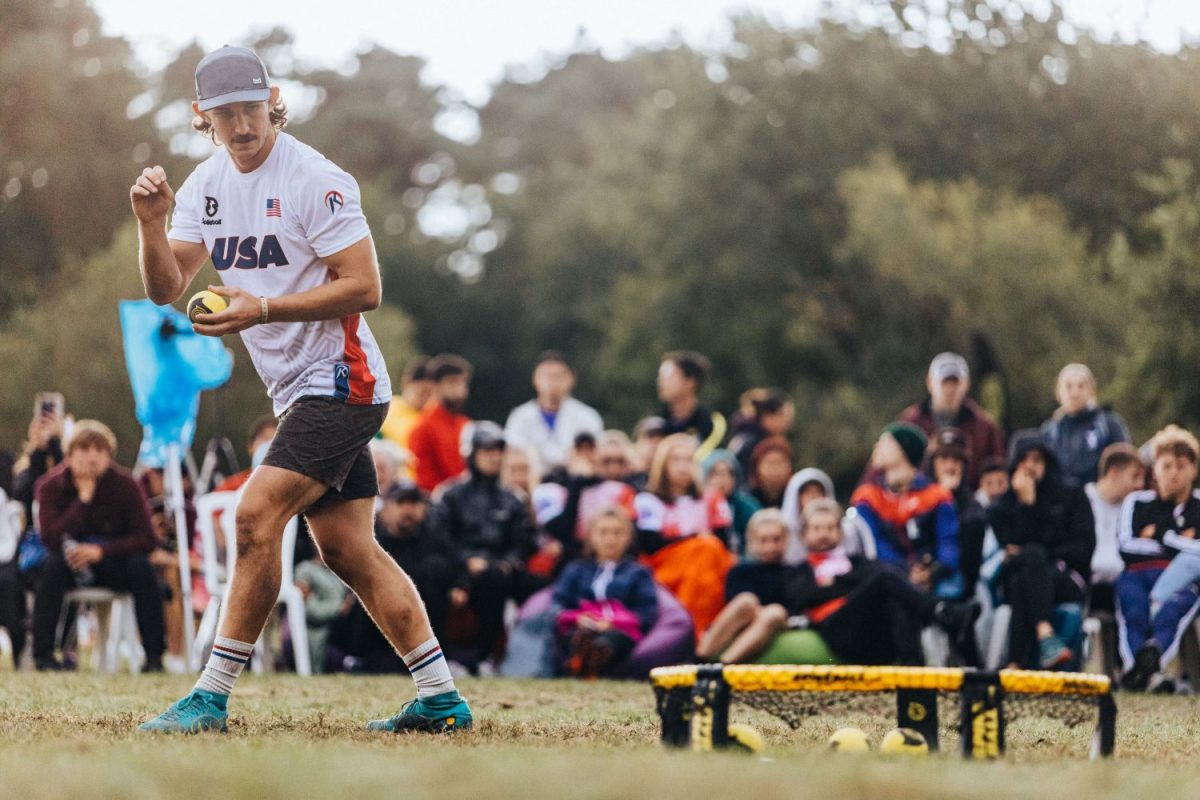Thwack! College campuses, beaches and parks across the United States reverberate with the sound of a trampoline being struck. Bodies dive in a whirl of hands and elbows, throwing caution to the wind in a wild race to compete.
Over the last 10 years, roundnet, more commonly known by the brand name Spikeball, has taken the college world by storm.
“It looks like a game of volleyball but instead of hitting it over a net you bounce it off one,” said Liam Shand, an exchange student at San Diego State University.
Shand had never seen the game before he came to the U.S. from the United Kingdom.
“It looks really fun though,” Shand said. “I want to give it a try and see if I’m any good because it does seem pretty hard.”
Roundnet is a simple game invented by Jeff Knurek in 1989. Teams of two or three players face each other around an ankle-height trampoline.
One team will start with a ball — which they serve to the opposition team — by tossing it up into the air and then hitting it with an open hand onto the trampoline. The ball bounces up and the other team attempts to return it before it touches the ground.
Players try to force the opposition team into failing to return the ball to the trampoline within three touches. Teammates must alternate who touches the ball, the same player touching it twice would result in a point for the other team. When a ball hits the ground or the rim of the trampoline, a point is awarded to the opposition team.
Games of roundnet are usually played to a score of 11, 15 or 21. The winning team must also hold a two-point advantage to leave victorious, similar to tennis.
The games are fast-paced as players serve and are almost immediately on the move, dropping back to try and return the opposition’s shot. Cat-like reflexes and lightning-fast movements are key to winning in a game that prioritizes teamwork and speed above all else.
“We organize competitions between my friendship group in the summer,” said Aiden Breen, a first-year from San Diego Mesa College. “We get around four or five teams down and then try and organize a bracket. It’s a lot of fun, and we always try to get out on the beach because it’s a lot more fun on the sand.”
Former San Diego State student, Buddy Hammon, started playing roundnet in 2012 after seeing an advert for it online. He is now the 2023 World Champion and is seen as the best player in the sport by many.
“I was initially attracted to roundnet as it looked like a great backyard game that I could play with my friends and something I might be good at with my beach volleyball background,” Hammon said.
Once Hammon started playing, he found his niche and quickly rose through the ranks as one of the sport’s best players. Paired with his teammate Clark Marshall, the duo became unstoppable, winning the 2022 national championship and the 2023 world championship together.
“I think roundet has the possibility to become an incredibly popular sport worldwide,” Hammon said. “Just look at the growth since 2015, we just had the world championships with over 30 countries represented.”
The sport of roundnet rose in popularity after Chris Rueder took his company, Spikeball, onto Shark Tank in 2015.
Rueder failed to secure investment but the publicity that the show brought to the product boosted sales and the game spread to college campuses across the country. Now, there are over five million players and Spikeball is worth over $45 million.
Hammon is fresh off a world tour that took him from Asia to Europe and South America, where he coached other players and organized tournaments.
“The community is just so good,” Hammon said. “I can see the game developing into something truly global if we can get more people into it at a young age as it’s such an inclusive sport. You can really go as hard or as easy as you want.”









